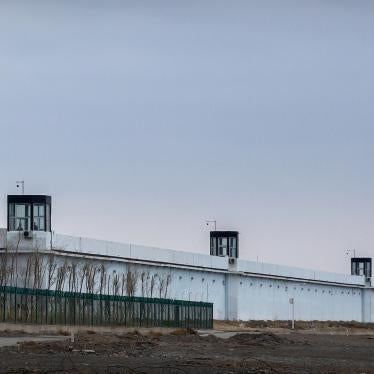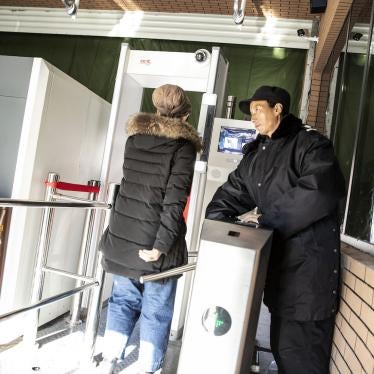Mr. Dan Eliasson
Director General
Migrationsverket
601 70 NORRKÖPING
Sweden
by facsimile and post: +46.11.108.155
Re: Application of Adel Abdul Hakim
Dear Mr. Eliasson,
We, the undersigned nongovernmental organizations, are writing in support of the application of Adel Abdul Hakim for a residence permit on humanitarian grounds in Sweden. Our organizations respectfully request that the Swedish Migration Board evaluate the totality of the circumstances surrounding Mr. Hakim’s claim for resettlement and consider that the rights of recognized refugees, the right to family reunification, and the prohibition against torture so clearly implicated in his case strongly favor a positive decision on his application.
Refugee Status
Adel Hakim is a recognized refugee. He is an ethnic Uighur who was persecuted in China and fled that country due to increasingly repressive actions by the Chinese authorities targeting Uighurs in the aftermath of a February 1997 demonstration in Ghulja. He was imprisoned in China in 1997 and again in 1998, and was tortured and ill-treated both times. After fleeing China in 1999, Mr. Hakim traveled to Kyrgyzstan and Pakistan, arriving in Afghanistan in 2001. In October 2001, the village where he was staying was bombed, and he fled with a group of Uighur men back to Pakistan. Members of that group, including Mr. Hakim, were handed over to the Pakistani authorities in December 2001. They later learned that a bounty per head had been paid to local tribesmen for their capture.
The Uighurs were detained briefly by the Pakistani army and were interrogated by US personnel in civilian clothing. Subsequently, they were handed over to the custody of US forces and flown to Afghanistan. The Uighurs remained in military detention in Kandahar until June 2002 when they were transferred to the detention facility at Guantanamo Bay, Cuba. During the entire time he was held at Guantanamo, Mr. Hakim was not permitted to phone or to speak directly with any of his family members. He was in complete isolation from his family and the outside world, with the exception of his US-based lawyer, Sabin Willett.
In March 2005, a Combatant Status Review Tribunal ruled that Adel Hakim was not an enemy combatant. The US government determined that he could not be repatriated to China due to the risk of torture upon return. On May 5, 2006, Adel Hakim and four other Uighurs were transferred to Albania, which had agreed to offer protection to the men. Adel Hakim was granted asylum by the Albanian government in July 2006.
Mr. Hakim secured a visa to travel to Sweden to attend a human rights conference in November 2007. Upon arrival, he submitted an application to the Swedish Migration Board seeking permission to remain in Sweden and be permanently reunited with his sister, who is his only relative outside of China and a political refugee residing in Sweden.
Mr. Hakim learned subsequently that two of his wife’s brothers had died since he fled China. His brother-in-law, Abdumijit Abdurahman, was executed in China in 2001 at age 29. A second brother-in-law, Abduhalil Abdurahman, died in a Chinese prison in 2007 at age 41 from lack of adequate medical attention.
Local Integration Prospects
Adel Hakim was released from Guantanamo Bay and sent to Albania without the knowledge of his lawyer and without any choice regarding the country to which he would be transferred. Given the risk of return to China, he had no other option but to apply for asylum in Albania.
The United Nations High Commissioner for Refugees (UNHCR) outlines three scenarios that signal a “durable solution” for a refugee: voluntary repatriation, local integration into the country of refuge, or resettlement in a third country. As noted above, it is impossible for Mr. Hakim to be repatriated as he will be at risk of persecution, including torture and other ill-treatment, in China. The US and Albanian governments have openly acknowledged that risk.
While the Albanian government has generously provided Mr. Hakim with legal protection, its capacity to ensure him meaningful local integration in Albania is extremely poor. According to the UNHCR Resettlement Handbook (2004), resettlement as a durable solution must be accompanied by meaningful prospects for local integration, characterized in part by access to work that provides a living wage; education; fundamental medical (including necessary psychological) services; property; and family support or the support of a similarly situated refugee community.
Mr. Hakim’s prospects for meaningful integration in Albania are poor to non-existent for the following reasons, well-documented in his formal application:
• There is no significant refugee population in Albania, and thus extremely limited infrastructure, services, and support for Mr. Hakim;
• No Uighur community exists in Albania, nor is there a significant, similarly situated refugee community to offer long-term, culturally appropriate social support;
• Mr. Hakim has no family members in Albania, and there is no realistic possibility that his wife and children, currently under surveillance in China, will be able to join him in Albania;
• Besides Mr. Hakim’s four compatriots, there are no Uighur-speakers in Albania, and no Uighur interpreters who regularly work there;
• Mr. Hakim’s attempts to learn Albanian have failed due to problems with retaining and adequately paying language teachers;
• Mr. Hakim’s prospects for continuing his education or attending vocational school are poor, particularly given the language deficit;
• Mr. Hakim is unemployed in Albania and, given dire economic conditions in that country, his prospects for employment are extremely poor;
• No consistent counseling and/or mental health services for torture victims are available in any language in Albania, let alone in the Uighur language.
We believe that Mr. Hakim’s situation in Albania, characterized by the lack of opportunities and genuine obstacles to integration detailed above, qualify him for resettlement in a country that not only will provide him with refuge from persecution, but with the cultural, social, educational, and economic support essential for him to lead a full life.
Family Reunification and Refugee Community Support
A key indicator of meaningful integration in the country of refuge is family support and integration into the refugee community. If it can be concluded that family or community support is absent, then resettlement to a country where such support is available should be considered (UNHCR Resettlement Handbook, Section 4.9.2.3(d)).
Adel Hakim’s wife and children remain in China. There is no prospect for Mr. Hakim to be reunited with them in Albania. The only family that Mr. Hakim has left outside China is his sister, Kavser Hakamjan and her family, who currently reside in Sundbyberg, a suburb of Stockholm. Ms. Hakamjan is a refugee in Sweden. She thought for many years that her brother was dead and was shocked and relieved to discover that he was alive and at Guantanamo Bay.
In recent years, UNHCR has encouraged governments to expand the criteria for family reunification, recognizing that the principle of “dependency” underpinning familial relations should lead to “flexible and expansive family reunification criteria that are culturally sensitive and situation specific” (UNHCR Background Note: Family Reunification in the Context of Resettlement and Integration, June 2001):
(Ibid., I.1.c)
An expanded notion of what constitutes a family has also been acknowledged by the European Union as reflected in the Council Directive on the Right to Family Reunification (2003; entry into force October 3, 2005). The directive permits member states to authorize the entry and residence of “first-degree relatives in the direct ascending line of the sponsor … where they are dependent on them and do not enjoy proper family support in the country of origin” (Ibid., article 4.2.a).
Adel Hakim has no family outside China other than his sister and her family in Sweden. Moreover, there is a sizeable Uighur community in and around Stockholm that numbers over 500 and actively engages its members in a culturally appropriate manner with various forms of social, emotional, and economic support.
The “peculiarities” of Mr. Hakim’s situation are evident in the details of his flight from China and the odyssey that led to his incarceration at Guantanamo Bay, his arrival in Albania, and his presence now in Sweden. He is totally dependent on his sister and her family for social and emotional support, and on the Uighur community in Sweden for various forms of ongoing community support.
Torture Victims and Treatment Issues
Mr. Hakim is currently the recipient of services from the Swedish Red Cross Centre for Torture Victims. His engagement with the Centre reflects the need for psychological counseling with a view to rehabilitation for the abuses he suffered in China and during his detention at Guantanamo Bay.
It is well-established, in accordance with international human rights, humanitarian, and refugee law, and taking account of individual circumstances, that victims of serious human rights violations, including torture, should be provided, as appropriate and proportional to the gravity of the violation and the circumstances of each case, with reparations, including restitution, compensation, rehabilitation, satisfaction and guarantees of non-repetition and prevention. (United Nations, Basic Principles and Guidelines on the Right to a Remedy and Reparation for Victims of Gross Violations of International Human Rights Law and Serious Violations of International Humanitarian Law, 2005).
While the prospects of Mr. Hakim receiving reparation in the form of compensation from either the Chinese or US governments are virtually nil, he is currently in the care of a world class torture rehabilitation center in Sweden. No such center exists in Albania and even routine psychological services, not geared to the specific needs of torture victims, are few.
Resettlement of former Guantanamo Bay Detainees
A number of European governments, including the Swedish government, have stated that it is primarily the responsibility of the US to offer resettlement on the US mainland to those detainees at Guantanamo Bay who cannot be repatriated to their home countries due to their fear of risk of torture and ill-treatment upon return. Our organizations believe that the US government should close the detention facility at Guantanamo Bay immediately and in principle agree that the US should offer protection in the US to those detainees who fear torture and ill-treatment if repatriated.
The practical reality, however, is that the US government has indicated that no detainee will be transferred to the mainland and that none will be offered asylum or any other form of protection. The detainees themselves thus become pawns in a stalemate: they cannot go home for fear of abuse, but no country will commit to offering them resettlement.
Such a “no win” situation requires that governments with a commitment to the torture prohibition and the rule of law step up and in the spirit of their dedication to human rights offer protection to vulnerable Guantanamo Bay detainees cleared for release and, as in the present case, to those former detainees in Albania who cannot be integrated in a meaningful way into the local community. In particular, detainees and former detainees with a family or other link to a specific country should be considered for resettlement in that country.
In the case of Adel Hakim, whose sister is a recognized refugee in Sweden, that link is clear.
Conclusion
Sweden can reaffirm its compassion as well as its commitment to the torture prohibition and the rule of law by acknowledging the injustices that Adel Hakim has suffered and permitting him to settle in Sweden, reunite with his family, receive treatment, and generally enjoy the support of the Uighur community.
Sincerely,
AIRE Centre (Advice on Individual Rights in Europe), London
Amnesty International – Swedish Section, Stockholm
Center for Constitutional Rights, New York
Human Rights Watch, New York
International Commission of Jurists, Geneva
Fédération Internationale des ligues des Droits de l’Homme, Paris
Redress, London
Reprieve, London
Swedish Helsinki Committee, Stockholm
Swedish Network of Refugee and Asylum Support Groups, Stockholm
World Organisation Against Torture, Geneva








